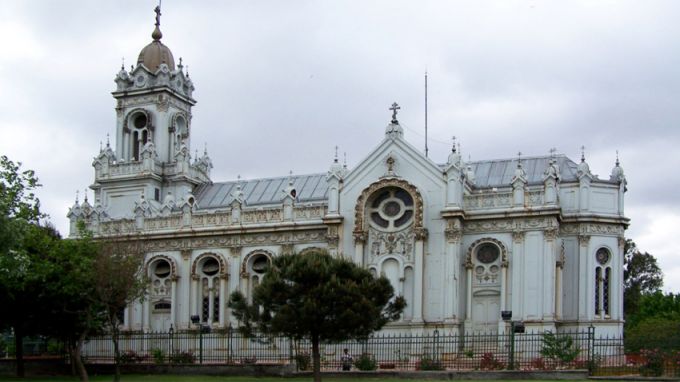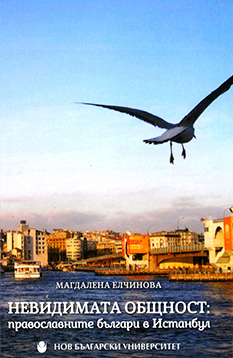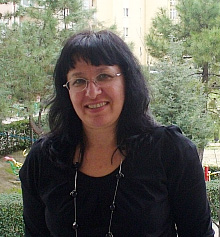
Decades ago, the Bulgarian Orthodox community in Istanbul, Turkey, used to be quite numerous, but with time many of its members gradually emigrated from Turkey - fewer of them settled in Bulgaria, while most opted for a future beyond the ocean - in the US, Canada, and Australia.
 Today, Orthodox Bulgarians in Istanbul are not more than 450. Readers are introduced to them in a recently published monograph, "The Invisible Community: Orthodox Bulgarians in Istanbul” by Magdalena Elchinova, Head of the Department of Anthropology at New Bulgarian University. The book presents the results of anthropological research of this small community. It tracks how the ethnicity of its members has been preserved over time, and how they fit into the life of the huge city of Istanbul.
Today, Orthodox Bulgarians in Istanbul are not more than 450. Readers are introduced to them in a recently published monograph, "The Invisible Community: Orthodox Bulgarians in Istanbul” by Magdalena Elchinova, Head of the Department of Anthropology at New Bulgarian University. The book presents the results of anthropological research of this small community. It tracks how the ethnicity of its members has been preserved over time, and how they fit into the life of the huge city of Istanbul.
„Most of them are at least a second generation Bulgarians born in Istanbul”, Assoc. Prof. Elchinova explains. “The ancestors of many of them settled in the city in the early 20 c. in the wake of the events including the Ilinden Uprising, the Second Balkan War of 1913 and World War I. These events promoted the strongest emigration waves and one of the targets of emigrants was Istanbul. For most cases the starting point of the journey of resettlement was the region known as Aegean Macedonia in what is Northern Greece today. A small percentage of these people are descenders of settlers from Edirne Thrace where there was a compact Bulgarian community until the 1920s.”
More from Assoc. Prof. Elchinova on how Bulgarian Christians have managed to preserve their ethnic and religious identity in a foreign environment:
 „This question has also been intriguing for me because over time this community has not maintained brisk contacts with Bulgaria: especially during the communist regime in this country, because at that time Bulgaria and Turkey used to stand on both sides of an ideological divide. Despite limited communication with Bulgaria they self-define as Bulgarians and Orthodox Christians. I think that their Bulgarian awareness mostly benefits from their religion – seen as an amalgam of faith, religious rituals, and above all an institution and heritage. Under Turkish law they have set up a foundation which takes care of the real properties of the Bulgarian Exarchate of the past which used to be based in Istanbul – the center of the Exarchate, St. Stefan Church known as the Iron Church, the Bulgarian cemetery and others. They take care of these places and this makes the community socially active and distinct because they communicate with the local authorities in Istanbul to be able to receive funding for the maintenance of cultural and historical monuments. Over the past 20 years the Bulgarians in Istanbul have had busier contacts with the Bulgarian state which has also been supportive in this regard.”
„This question has also been intriguing for me because over time this community has not maintained brisk contacts with Bulgaria: especially during the communist regime in this country, because at that time Bulgaria and Turkey used to stand on both sides of an ideological divide. Despite limited communication with Bulgaria they self-define as Bulgarians and Orthodox Christians. I think that their Bulgarian awareness mostly benefits from their religion – seen as an amalgam of faith, religious rituals, and above all an institution and heritage. Under Turkish law they have set up a foundation which takes care of the real properties of the Bulgarian Exarchate of the past which used to be based in Istanbul – the center of the Exarchate, St. Stefan Church known as the Iron Church, the Bulgarian cemetery and others. They take care of these places and this makes the community socially active and distinct because they communicate with the local authorities in Istanbul to be able to receive funding for the maintenance of cultural and historical monuments. Over the past 20 years the Bulgarians in Istanbul have had busier contacts with the Bulgarian state which has also been supportive in this regard.”
For generations the Bulgarian community in Istanbul was in close cohesion with the Bulgarian Exarchate. Belonging to the church is another way of them self-defining as Bulgarians by ethnicity. Another key factor to keep them together is the Bulgarian language whose function though has gradually lost momentum. Today only part of them still use their mother tongue within their family circles.
Traditions are central to the life of Istanbul Bulgarians. Key pillars of community life include the church feasts of St. George, Easter, the Nativity of Christ and some feasts of popular Christianity:
„Such an event is the Sirnitsa (Cheesefare) Masquerade. This rite has been inherited from the places of origin of Istanbul Bulgarians. Today however it features the spirit of a city masquerade and is not reminiscent of village festivals of the past.”
Assoc. Prof. Magdalena Elchinova has a few reasons to term the Orthodox Bulgarians in Istanbul “an invisible community”.
„Well, in the first place, they are a small community and sort of get lost in the colorful mosaic of the multimillion city. Secondly, they are quite an established local population and are well integrated into the urban environment. In fact they belong to the secularly oriented Istanbul residents from the middle class. However, my chief argument to give precisely this title to the book is the fact that this community remains unfamiliar to the public in both Bulgaria and Turkey. Recently there has been some sporadic information about the community in Bulgarian media. In Turkey there is no officially recognized Bulgarian minority and they are known as a Bulgarian community only to their neighbors in the housing areas they live in, and to city authorities with whom they cooperate.”
English Daniela Konstantinova